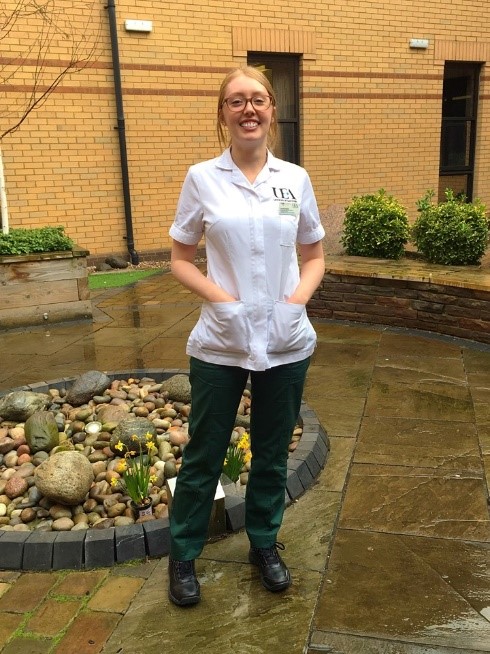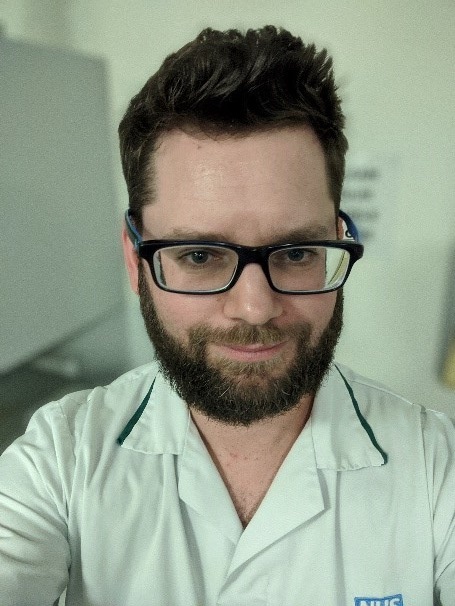Graduates Lauren Britcher and David Mason both work as occupational therapists (OT). They write about their experiences of working for the NHS during a global pandemic, the challenges they’ve faced and how they’ve had to adapt.

Lauren Britcher: ‘I wanted to work with others to help them live their life to the fullest, regaining purpose and meaning’
This photo was taken on my last day of placement as an Occupational Therapy student. I never thought then that within my first year of practice I’d find myself working in the NHS during a pandemic.
I always knew I wanted a career within a healthcare setting. I wanted to work with others to help them live their life to the fullest, regaining purpose and meaning. Occupational therapy perfectly encompasses these objectives at the heart of its practice. I knew it was the right career for me and so I applied for the occupational therapy degree programme at UEA.
After qualifying I began working in a rotation post within an acute NHS hospital. I’ve only been in this role for nine months and I'm still finding my feet as a newly qualified OT. Since the outbreak of COVID-19 my role has changed to meet the needs and pressures that the acute hospital setting is facing.

I’m currently working across multiple wards, which requires me to apply my transferable skills to work with patients who are experiencing falls, stroke, orthopaedic trauma, surgery, end of life care and brain injury. Some of these patients are also testing positive for COVID-19.
Working with these patients has resulted in me adapting my practice to limit close distance contact and complete assessments within the 20-minute time frame in which my face mask will protect both me and my patient. A core aspect of my role is to support patients in their hospital discharge, including any concerns or worries they may have. All COVID-19 patients have anxieties around this.
The biggest challenge is helping them manage the emotional and mental battle of COVID-19, and doing so within 20 minutes, head-to-toe in PPE, where the humanity feels lost. Adapting communication skills, and signposting to community volunteer services has been crucial in supporting patients to get home and be safe.
Studying occupational therapy at UEA equipped me with knowledge of multiple conditions, which has allowed me to have some understanding when working across specialities within the hospital. The programme has a strong focus on creativity and adaptation, and workshops on communication skills and resilience have been crucial to ensure I support my patients and myself at this time, so we all stay safe and get through it together.
David Mason: ‘It can be distressing to patients to be outside of their home environment, seeing members of staff wearing masks and gowns, and unable to have family visit them’
I studied to be an OT because I wanted to help people recover from mental and physical illnesses. After completing an undergraduate degree in Sociology, I had initially enrolled in a graduate scheme for future social workers, which gave me the opportunity to work with OTs and get an insight into their role.
A major attraction for me was finding a role which united my interests in psychology and sociology, as well as the applied aspects, such as health promotion, evidence based practice, and quality of life.
I currently work as an OT in an Emergency Department. My job is to act as a link between the community and the acute hospital, completing functional assessments and liaising with community services.
My current role has changed very little in terms of the therapy process. I still assess patients who are medically suitable for discharge, with a one hour target response time from referral to assessment. Nevertheless, as a team we’ve needed to be flexible and resilient in order to adapt to additional pressures.

We are required to wear additional PPE when assessing patients and this can be a barrier to effective communication, particularly for patients who have hearing or cognitive impairments. It can also be distressing to patients to be outside of their home environment, seeing members of staff wearing masks and gowns, and unable to have family visit them.
The occupational therapy programme helped prepare me in several ways. It gave me a focus on evidence-based therapy practice, weighing up the pros and cons of published research, and the importance of scientific rigor. Because of this, I’ve managed to avoid getting caught up in a lot of the ‘noise’ reported in newspapers. Instead I’m using more appropriate academic sources to get information.
My skills have also helped my work/life balance and keeping occupied at home, despite not being able to socialise with my friends and family as normal. I’ve continued my yearly planting of chilli plants and have been able to spend a little time at my allotment, where I’m currently growing peas, sweetcorn and potatoes. This has helped with mindfulness, something I developed an appreciation for after studying.
Do you have a story to share? Please email communications@uea.ac.uk

:focus(1943x1679:1944x1680))